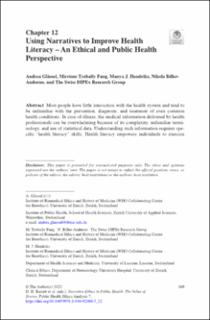Please use this identifier to cite or link to this item:
https://doi.org/10.21256/zhaw-24978Full metadata record
| DC Field | Value | Language |
|---|---|---|
| dc.contributor.author | Glässel, Andrea | - |
| dc.contributor.author | Tyebally Fang, Mirriam | - |
| dc.contributor.author | Hendriks, Manya J. | - |
| dc.contributor.author | Biller-Andorno, Nikola | - |
| dc.date.accessioned | 2022-05-12T14:25:30Z | - |
| dc.date.available | 2022-05-12T14:25:30Z | - |
| dc.date.issued | 2022 | - |
| dc.identifier.isbn | 978-3-030-91443-1 | de_CH |
| dc.identifier.isbn | 978-3-030-92080-7 | de_CH |
| dc.identifier.uri | https://digitalcollection.zhaw.ch/handle/11475/24978 | - |
| dc.description.abstract | Most people have little interaction with the health system and tend to be unfamiliar with the prevention, diagnosis, and treatment of even common health conditions. In case of illness, the medical information delivered by health professionals can be overwhelming because of its complexity, unfamiliar terminology, and use of statistical data. Understanding such information requires specifc “health literacy” skills. Health literacy empowers individuals to exercise their autonomy and self-determination regarding health-related matters. This chapter explores how health literacy and ethical questions are interrelated as illustrated using actual patient narratives of a woman’s pregnancy experiences. The narratives were collected as part of the Swiss DIPEx (Database of individual patients’ experiences) database. We demonstrate that narratives of health experiences can be used to enhance health literacy. Firstly, narratives can convey complex information in an easily understandable manner. Secondly, they allow policymakers to understand, the informational needs of users of the health care system and the communication gaps they perceive can help improve the health care system and qualitative evaluate and improve medical communication efforts. The chapter ends by raising a number of ethical questions at the individual and health system level related to the use of narratives for improving health literacy for discussion. | de_CH |
| dc.language.iso | en | de_CH |
| dc.publisher | Springer | de_CH |
| dc.relation.ispartof | Narrative ethics in public health : the value of stories | de_CH |
| dc.relation.ispartofseries | Public Health Ethics Analysis | de_CH |
| dc.rights | http://creativecommons.org/licenses/by/4.0/ | de_CH |
| dc.subject | Health literacy | de_CH |
| dc.subject | Patient experience | de_CH |
| dc.subject | Pregnancy | de_CH |
| dc.subject | Database of Individual Patients’ Experiences (DIPEx) | de_CH |
| dc.subject | Vulnerability | de_CH |
| dc.subject | Narrative | de_CH |
| dc.subject.ddc | 610: Medizin und Gesundheit | de_CH |
| dc.subject.ddc | 808: Rhetorik und Schreiben | de_CH |
| dc.title | Using narratives to improve health literacy : an ethical and public health perspective | de_CH |
| dc.type | Buchbeitrag | de_CH |
| dcterms.type | Text | de_CH |
| zhaw.departement | Gesundheit | de_CH |
| zhaw.organisationalunit | Institut für Public Health (IPH) | de_CH |
| zhaw.publisher.place | Cham | de_CH |
| dc.identifier.doi | 10.1007/978-3-030-92080-7_12 | de_CH |
| dc.identifier.doi | 10.21256/zhaw-24978 | - |
| zhaw.funding.eu | No | de_CH |
| zhaw.originated.zhaw | Yes | de_CH |
| zhaw.pages.end | 180 | de_CH |
| zhaw.pages.start | 169 | de_CH |
| zhaw.parentwork.editor | Barrett, Drue H. | - |
| zhaw.parentwork.editor | Ortmann, Leonard W. | - |
| zhaw.parentwork.editor | Larson, Stephanie A. | - |
| zhaw.publication.status | publishedVersion | de_CH |
| zhaw.series.number | 7 | de_CH |
| zhaw.publication.review | Editorial review | de_CH |
| zhaw.author.additional | Yes | de_CH |
| zhaw.display.portrait | Yes | de_CH |
| Appears in collections: | Publikationen Gesundheit | |
Files in This Item:
| File | Description | Size | Format | |
|---|---|---|---|---|
| 2022_Glässel-etal_Using-Narratives-to-improve-Health-Literacy.pdf | 241.56 kB | Adobe PDF |  View/Open |
Show simple item record
Glässel, A., Tyebally Fang, M., Hendriks, M. J., & Biller-Andorno, N. (2022). Using narratives to improve health literacy : an ethical and public health perspective. In D. H. Barrett, L. W. Ortmann, & S. A. Larson (Eds.), Narrative ethics in public health : the value of stories (pp. 169–180). Springer. https://doi.org/10.1007/978-3-030-92080-7_12
Glässel, A. et al. (2022) ‘Using narratives to improve health literacy : an ethical and public health perspective’, in D.H. Barrett, L.W. Ortmann, and S.A. Larson (eds) Narrative ethics in public health : the value of stories. Cham: Springer, pp. 169–180. Available at: https://doi.org/10.1007/978-3-030-92080-7_12.
A. Glässel, M. Tyebally Fang, M. J. Hendriks, and N. Biller-Andorno, “Using narratives to improve health literacy : an ethical and public health perspective,” in Narrative ethics in public health : the value of stories, D. H. Barrett, L. W. Ortmann, and S. A. Larson, Eds. Cham: Springer, 2022, pp. 169–180. doi: 10.1007/978-3-030-92080-7_12.
GLÄSSEL, Andrea, Mirriam TYEBALLY FANG, Manya J. HENDRIKS und Nikola BILLER-ANDORNO, 2022. Using narratives to improve health literacy : an ethical and public health perspective. In: Drue H. BARRETT, Leonard W. ORTMANN und Stephanie A. LARSON (Hrsg.), Narrative ethics in public health : the value of stories. Cham: Springer. S. 169–180. ISBN 978-3-030-91443-1
Glässel, Andrea, Mirriam Tyebally Fang, Manya J. Hendriks, and Nikola Biller-Andorno. 2022. “Using Narratives to Improve Health Literacy : An Ethical and Public Health Perspective.” In Narrative Ethics in Public Health : The Value of Stories, edited by Drue H. Barrett, Leonard W. Ortmann, and Stephanie A. Larson, 169–80. Cham: Springer. https://doi.org/10.1007/978-3-030-92080-7_12.
Glässel, Andrea, et al. “Using Narratives to Improve Health Literacy : An Ethical and Public Health Perspective.” Narrative Ethics in Public Health : The Value of Stories, edited by Drue H. Barrett et al., Springer, 2022, pp. 169–80, https://doi.org/10.1007/978-3-030-92080-7_12.
Items in DSpace are protected by copyright, with all rights reserved, unless otherwise indicated.